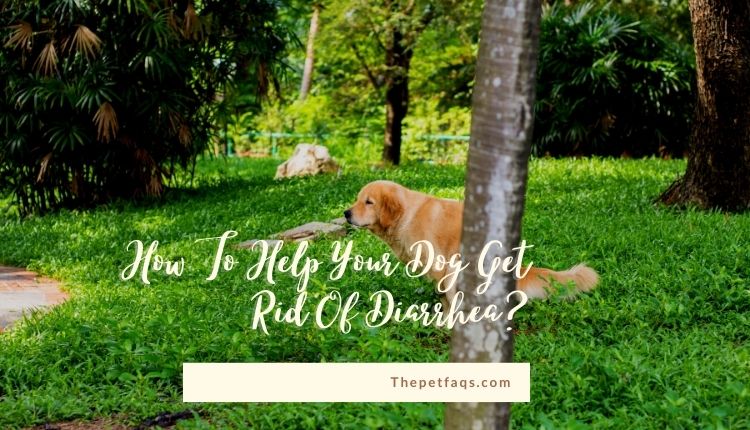How To Help Your Dog Get Rid Of Diarrhea: Know the Causes, Symptoms and Treatments!
Diarrhea is a common complaint among dogs, which can be caused by many things, including diet.

However, if your dog has the symptoms of diarrhea, it is best to consult your vet as soon as possible. Also, consult a dog behaviorist for suggestions on how to help your dog get rid of diarrhea.
How To Help Your Dog Get Rid Of Diarrhea? What to Do and Not Do:

1. Do not give your dog water unless he or she is drinking plenty of fresh, clean water.
2. Avoid giving your high-quality dog food that is too hard to digest (i.e., Kongs). Some types of kibble can contain ingredients that cause diarrhea in dogs, so make sure you are feeding them appropriate quality dry food instead.
3. If you have any suspicions about the cause of your dog’s diarrhea, consult your vet. Diarrhea can be caused by a variety of factors and needs to be treated as such.
4. If you have been giving your dog the same food and water for more than two days without improvement, consult a veterinarian as soon as possible; this may indicate that something more serious is going on with your dog’s health.
How to Know When You Can Treat Diarrhea at Home:

If your dog is vomiting and has diarrhea, the best course of action is to take him or her to the veterinarian. However, if your dog only has diarrhea, there are some things you can do at home to help remedy the situation.
1. Make sure that your dog’s diet consists of high-quality food that is easy for them to digest – this will help relieve their bowel problems and restore their energy levels. For example, try feeding them kibble, canned food, or a diet made up of meat and vegetables.
2. Keep your dog hydrated by giving them lots of fresh water and plenty of ice chips to drink.
3. Give your dog plenty of rest – if they are sick, their body cannot fight off infection as well as it should, which can lead to more serious health problems down the road.
How to Know When Diarrhea is a Medical Emergency:

If your dog has a fever, is vomiting, or has bloody diarrhea, consult a veterinarian as soon as possible. Likewise, if your dog shows any other signs of illness (i.e., severe dehydration), please take them to the vet immediately.
How to Treat Your Dog’s Diarrhea at Home:

If your dog has diarrhea, the best course of action is to give them food and water that is easy for them to digest. You can also give them ice chips and fresh water to drink in order to keep them hydrated. If your dog’s diarrhea does not improve within 48 hours, please take him or her to the veterinarian.
Rest:
Dogs are not able to fight off infection as well when sick, which can lead to more serious health problems down the road. So give your dog plenty of rest so they can get better quickly.
Fasting:
If your dog has bloody diarrhea, it is best to fast them for 48 hours while they are on antibiotics. This will help clear up the infection and prevent any further problems.
Hydration:
Keep your dog hydrated by giving them lots of fresh water and plenty of ice chips to drink.
Food:
Try feeding them kibble, canned food, or a diet made up of meat and vegetables. This will help relieve their bowel problems and restore their energy levels.
After Fasting:
After fasting, your dog may need to drink a lot of water in order to help with hydration. You can also give them a few tablespoons of apple cider vinegar mixed with water for added relief.
Other Things That Can Help With Diarrhea:
- Cold medications (such as Aspirin or ibuprofen)
- Probiotics (live microorganisms that help promote gastrointestinal health)
- Supplements like pumpkinzyme, kaempferol, and ginger – Hydration therapy (e.g., fogging the area with cool water, spraying it on your dog’s coat) – Pedialyte or Ensure
If your dog is showing any other signs of illness, like fever, lethargy, or vomiting, please bring them to the veterinarian.
Fiber:
A high-fiber diet can help to relieve diarrhea. Feed your dog a diet that is high in fiber, such as fruits, vegetables, and whole grains. This will help to make sure their gut is properly cleaned, and they don’t experience any further bowel problems.
Promote Healing:
Give your dog plenty of rest, drink plenty of water, and feed them a high-fiber diet to help promote quick healing.
Over-the-Counter Medications and Why They Are Best to Avoid:
While over-the-counter medications like ibuprofen or Aspirin can be useful in relieving diarrhea, they should only be used as a last resort and under the guidance of your veterinarian. These medications can cause vomiting and gastrointestinal bleeding, which could lead to more serious health problems down the line. Instead, give your dog fluids and fiber to help clean their gut and promote speedy healing. If diarrhea is severe or ongoing, speak with your veterinarian about possible treatments.
Why You Should Use Extreme Caution With Imodium:
Imodium is a medication that is often used to relieve diarrhea. However, it can also cause abdominal pain and even death in very rare cases.
Use extreme caution when giving this medication to your dog – only do so under the guidance of your veterinarian. If symptoms become severe or continue after taking antibiotics or other medications, please bring your dog in for further evaluation by a veterinarian.
What If Home Treatment Doesn’t Work?
If home treatments don’t work and your dog is showing signs of dehydration, such as panting or lethargy, they may need to be brought in for evaluation by a veterinarian.
A diagnosis may require a blood test to determine if there is an underlying issue that needs to be treated. If you have any additional questions or concerns about your dog’s diarrhea, please speak with your veterinarian.
Diarrhea Can Cause Nutrient Deficiency
Diarrhea is a common condition, but if it’s severe or continues for more than three days, your dog may be suffering from a nutrient deficiency. This could lead to weight loss and other health problems. If you think your dog may be deficient in certain nutrients, speak with their veterinarian about testing for specific deficiencies. What Are Some Tips For preventing diarrhea in dogs?
There are a few simple steps you can take to prevent your dog from developing diarrhea. First, make sure they’re getting enough water – give them at least 2 cups per day, and make sure the water is fresh. Next, feed them a diet that consists of high-quality proteins and fiber. And be sure to keep their environment clean – give them plenty of opportunities to play outdoors, and avoid giving them treats that contain high-calorie foods.
Why Dogs Get Diarrhea:
There is no one answer to this question. Different dogs will respond differently to different illnesses and treatments, and some dogs simply get diarrhea more frequently than others. Some of the most common causes of diarrhea in dogs include:
1) Infectious agents – Charter can be caused by a variety of bacteria, viruses (e.g., coronavirus), protozoa, or fungi. Over-the-counter anti-diarrhea medications may treat some of the organisms that cause coronavirus diarrhea.
2) Gastrointestinal problems – Dogs with inflammatory bowel disease, parasites, or a chronic stomach problem may be more likely to develop diarrhea.
3) Food allergies – Peanuts are one of the most common triggers of food-related vomiting and diarrhea in dogs. Other foods that can cause gastrointestinal problems in dogs include wheat, soy, dairy products, eggs, corn, and citrus fruits.
4) Dehydration – Not drinking enough water is one of the most common causes of diarrhea in dogs. Additionally, insufficient hydration can lead to increased intestinal permeability, which allows bacteria and other toxins to enter the bloodstream and cause diarrhea.
Be Prepared to Answer Your Veterinarian’s Questions:
If your dog develops diarrhea, be prepared to answer questions from your veterinarian. For example, did diarrhea develop following a change in diet or medication, during a period of stress (such as travel ), after eating something unusual, after drinking contaminated water, or while on antibiotics? Your veterinarian may also ask about the history of gastrointestinal problems in your pet and whether any other animals in the home are exhibiting similar symptoms. In some cases, testing for intestinal parasites or other causes of diarrhea may be necessary.





